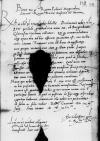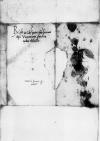Declaravit nobis Vestra Paternitas per litteras gratitudinem animi
sui ob burgrabiatum Gdanensem Georg Schewecke (Georg Scheffke) (*1491 – †1547), 1522 Gdańsk alderman; 1525 - town councillor; 1528 - judge; 1531 - mayor; 1536-1537, 1540, 1542-1545 - burgrave; 1534 Gdańsk envoy to convention in Lüneburg in affairs of seafaring and conflicts with Lübeck (AT 15, p. 501, 510; AT 16/1, p. 42, 44; ZDRENKA 2, p. 275)⌊viro bonoGeorg Schewecke (Georg Scheffke) (*1491 – †1547), 1522 Gdańsk alderman; 1525 - town councillor; 1528 - judge; 1531 - mayor; 1536-1537, 1540, 1542-1545 - burgrave; 1534 Gdańsk envoy to convention in Lüneburg in affairs of seafaring and conflicts with Lübeck (AT 15, p. 501, 510; AT 16/1, p. 42, 44; ZDRENKA 2, p. 275)⌋ collatum. Georg Schewecke (Georg Scheffke) (*1491 – †1547), 1522 Gdańsk alderman; 1525 - town councillor; 1528 - judge; 1531 - mayor; 1536-1537, 1540, 1542-1545 - burgrave; 1534 Gdańsk envoy to convention in Lüneburg in affairs of seafaring and conflicts with Lübeck (AT 15, p. 501, 510; AT 16/1, p. 42, 44; ZDRENKA 2, p. 275)⌊QuiGeorg Schewecke (Georg Scheffke) (*1491 – †1547), 1522 Gdańsk alderman; 1525 - town councillor; 1528 - judge; 1531 - mayor; 1536-1537, 1540, 1542-1545 - burgrave; 1534 Gdańsk envoy to convention in Lüneburg in affairs of seafaring and conflicts with Lübeck (AT 15, p. 501, 510; AT 16/1, p. 42, 44; ZDRENKA 2, p. 275)⌋ quod commendatione atque opera nostra ad hoc officium promotus est, non mediocriter laetamur. Favemus enim Georg Schewecke (Georg Scheffke) (*1491 – †1547), 1522 Gdańsk alderman; 1525 - town councillor; 1528 - judge; 1531 - mayor; 1536-1537, 1540, 1542-1545 - burgrave; 1534 Gdańsk envoy to convention in Lüneburg in affairs of seafaring and conflicts with Lübeck (AT 15, p. 501, 510; AT 16/1, p. 42, 44; ZDRENKA 2, p. 275)⌊illiGeorg Schewecke (Georg Scheffke) (*1491 – †1547), 1522 Gdańsk alderman; 1525 - town councillor; 1528 - judge; 1531 - mayor; 1536-1537, 1540, 1542-1545 - burgrave; 1534 Gdańsk envoy to convention in Lüneburg in affairs of seafaring and conflicts with Lübeck (AT 15, p. 501, 510; AT 16/1, p. 42, 44; ZDRENKA 2, p. 275)⌋ hunc magistratum cum propter virtutes eius, tum quod illum probe semper gessisse dicitur paper damaged⌈[r]r paper damaged⌉ [...] paper damaged⌈[...][...] paper damaged⌉ e paper damaged⌈[e]e paper damaged⌉tiam in futurum non dissimilem sui futurum a[...] paper damaged⌈[...][...] paper damaged⌉. Illud vero, quod in scheda ascripsit Vestra Paternitas, optime intel paper damaged⌈[estra Paternitas, optime intel]estra Paternitas, optime intel paper damaged⌉leximus. Quod nunc non successit, id [...] paper damaged⌈[...][...] paper damaged⌉ data occasione fieri poterit et Deus cor regiae maiestatis in id, qu paper damaged⌈[Sigismund I Jagiellon (Zygmunt I) (*1467 – †1548), King of Poland and Grand Duke of Lithuania (1506-1548); Duke of Głogów (Glogau) (1499-1506), Duke of Opava (1501-1506), Governor of Silesia (1504-1506); son of King Kazimierz IV Jagiellon and Elisabeth of Austria⌊regiae maiestatisSigismund I Jagiellon (Zygmunt I) (*1467 – †1548), King of Poland and Grand Duke of Lithuania (1506-1548); Duke of Głogów (Glogau) (1499-1506), Duke of Opava (1501-1506), Governor of Silesia (1504-1506); son of King Kazimierz IV Jagiellon and Elisabeth of Austria⌋ in id, qu]regiae maiestatis in id, qu paper damaged⌉od optamus, inclinare dignabitur. Nos etiam rem [...] paper damaged⌈[...][...] paper damaged⌉us adiuvare curabimus.
Nova, quae nobis perscripsit paper damaged⌈[perscripsit]perscripsit paper damaged⌉ Vestra Paternitas, vix vera esse existimamus, in hac praesertim rerum paper damaged⌈[rerum]rerum paper damaged⌉ ac hominum inconstantia. Utcumque tamen est, gratum es paper damaged⌈[es]es paper damaged⌉t nobis, quod nos earum rerum Vestra Paternitas participes fecerit. Si quid in posterum de his atque aliis rebus cognitum habuerit, communicare illa nobis non praetermittat.
Et salva ac felix valeat.


 BCz, 3465, p. 314
BCz, 3465, p. 314